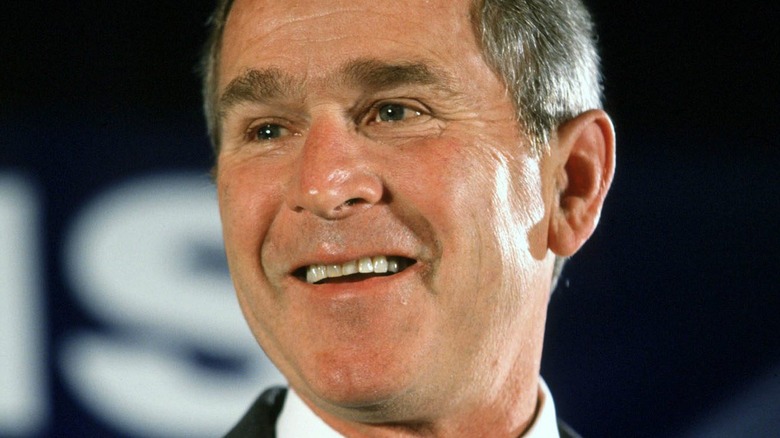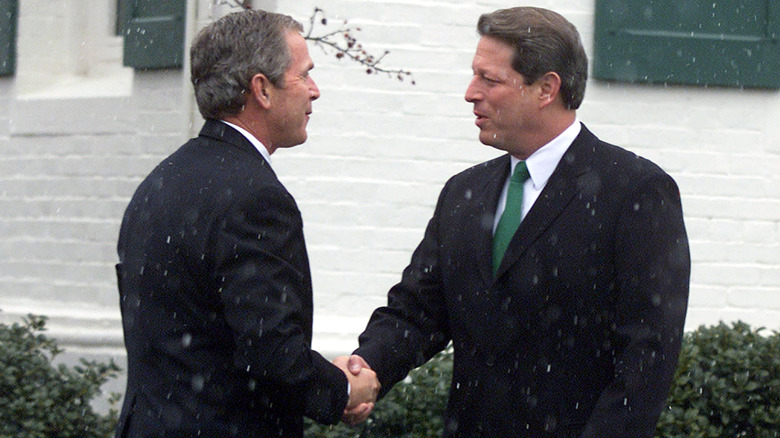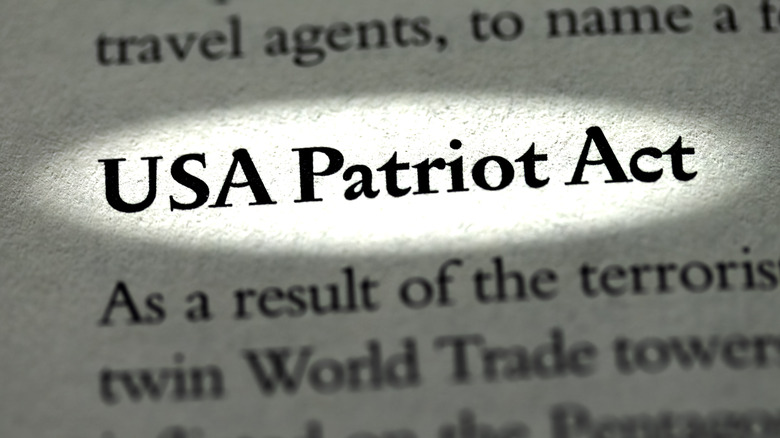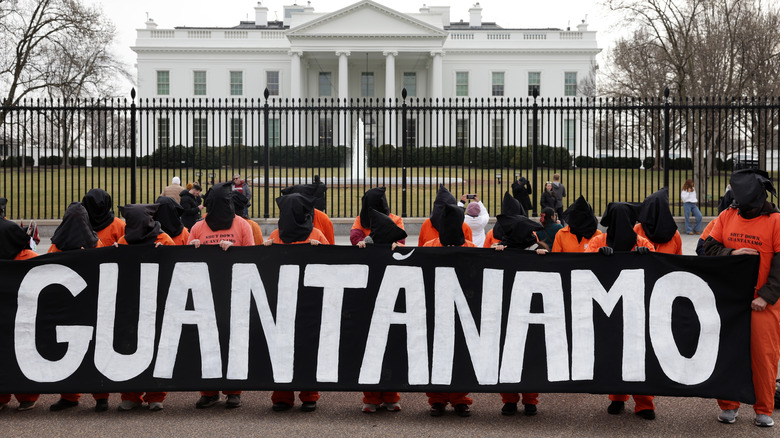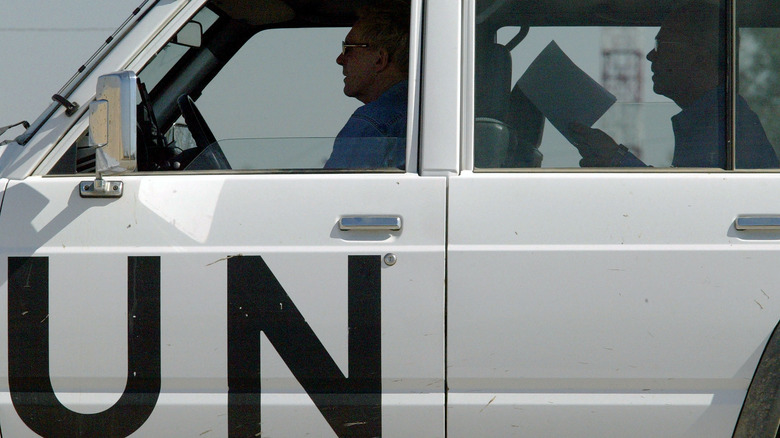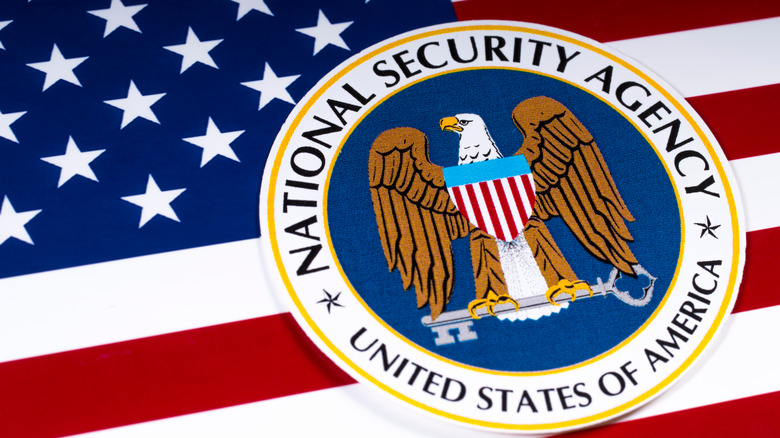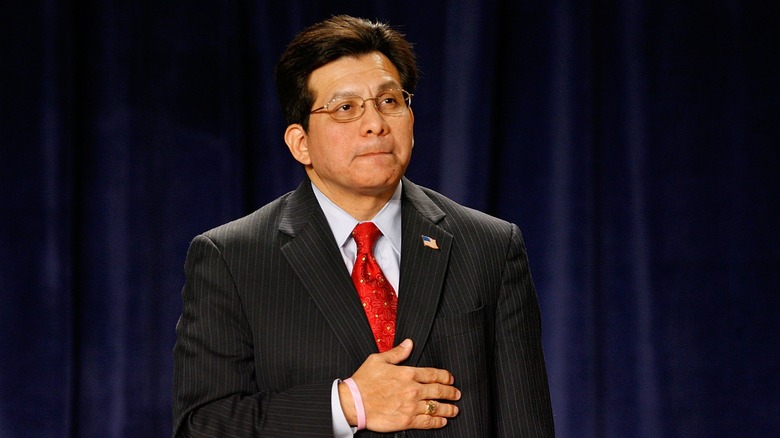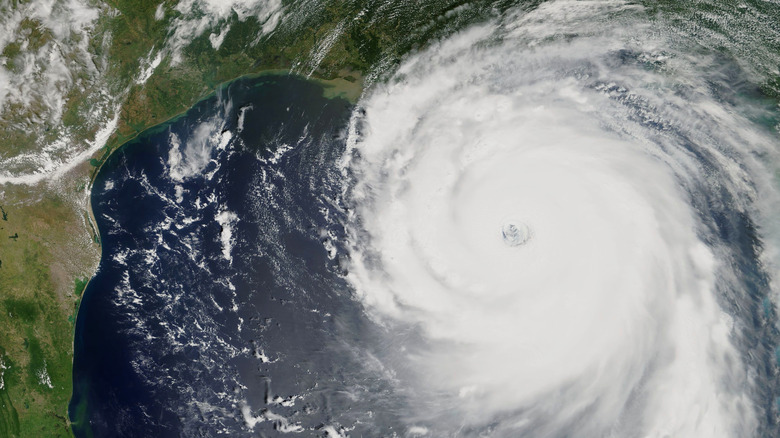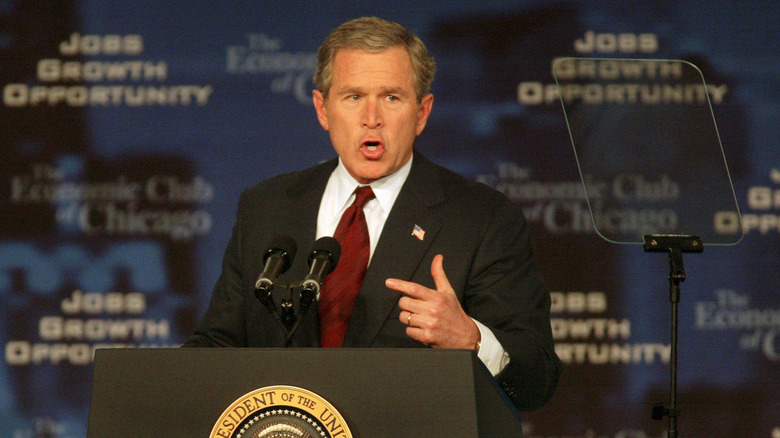Questionable Things About George W. Bush's Presidency
George W. Bush is one of the more controversial presidents the U.S. has ever had. While the affable-if-not-really-from-Texas Republican has been praised for some of his actions — most notably tackling the HIV/AIDs epidemic in Africa and raising test scores in schools — most of his major policy decisions have been met with serious scrutiny.
America was thrown into crisis during the very first year of Bush's presidency with the 9/11 attacks. Scrambling to respond to the disaster, Bush made some very big national security decisions that would be enormously divisive. Adopting an interventionist mindset, he opted to partake in foreign wars against America's enemies, despite serious misgiving at home and abroad. For most people, his wars in Afghanistan and Iraq proved to be too messy and too costly in the long run, overshadowing anything else that Bush did in his two terms as president. The conflicts raised major questions about the legitimacy of American foreign intervention and produced an entire oeuvre of pop-punk protest music in the early 2000s.
All in all, the Bush years have become synonymous with a string of major emergencies from September 11th to Hurricane Katrina. Bush would bow out of the oval office following a final, generation-defining disaster — the 2008 financial crisis — concluding a very memorable presidency.
Bush's election in 2000 may have been illegitimate
George W. Bush's first term as president got off to a bad start, with many people believing he won the election in 2000 by accident. The contest between Bush and his Democrat opponent Al Gore was nail-bitingly close, coming down to down to less than a thousand ballots. Technically speaking, Bush got fewer votes nationwide than Gore, who won the popular vote.
Although Bush was awarded the presidency after a protracted legal battle, it was unclear at the time whether the final 25 electoral votes needed from the state of Florida really belonged to the Republican candidate. When Gore tried to contest the result, Bush's legal team successfully stopped a state-wide recount of the undervotes (ballots that have not been properly stamped), based on a technicality. Per CNN, most studies of the election since 2000 have concluded that any recount that included undervotes would have resulted in a win for Bush anyway, but the manner in which the election was finally called left a bad taste in many people's mouths. The Supreme Court ruled that the battle for the presidency must come to an end — however, the Justices who pushed to end the election were Republican appointments. Gore nevertheless conceded to Bush, and Bush became president.
Depending on who you trust, a few studies have also concluded that Gore really did win the election. According to CNN, one USA Today study showed that if undervotes were not added to the recount, Gore would have won by three votes. Similarly, a study conducted by the Florida Ballots Project (which included both undervotes and overvotes) came down in Gore's favor.
The passing of the Patriot Act
George W. Bush's presidency began with one of the biggest catastrophes in American History: the 9/11 attacks. Bush's immediate response to the disaster has been widely condemned as a draconian overreaction that threatened American civil liberties.
Less than two months after the attack, Congress passed the Bush-backed Patriot Act, a series of measures, which expanded the state's ability to investigate and detain American citizens. In theory, the Act was supposed to help the administration root out terrorism, however, in practice, there is good reason to doubt it has been useful in this respect. A study by the ACLU found that between 2003 and 2006, the Act helped security services to convict just one terrorist and that for the most part, it has been used to investigate drug-related offenses. In 2010 alone, less than 1% of "sneak & peak" searches carried out under the Patriot Act were terrorism-related.
The Act granted the FBI license to read private emails, access financial data, track internet usage, and medical info, and break into private residences when the occupants were away. Although the fallout from 9/11 ensured that the bill received a lot of support from Congress, some measures contained in the legislation were later declared illegal by the Supreme Court. As of 2023, parts of the bill have actually expired, although its core powers remain in effect. What is left of the Patriot Act still receives a good deal of criticism, with detractors fearing the extraordinary powers it grants are open to abuse.
The skyrocketing use of torture
During his time in office, George W. Bush's crusade against Al-Qaeda led to some harsh security measures which escalated to include torture and extraordinary rendition. Just a few days after the 9/11 attacks were carried out, Bush granted the CIA liberty to create "black sites" — secret locations abroad where terrorist suspects could be questioned. By 2002, Bush had also granted the CIA permission to use "special interrogation techniques" on prisoners, on the grounds that one of their high-profile inmates — Abu Zubaydah — was suspected of being a key Al-Qaeda member.
The techniques security services began using included sleep deprivation practices, stress positions, slapping, forced nudity, confinement, and most brutally — waterboarding. All of these measures were okayed by Secretary-General John Ashcroft but it is disputed how much Bush knew about the techniques when they were first introduced.
In an attempt to skirt around the Geneva Convention's prohibition against torture, prisoners were defined as unlawful combatants rather than prisoners of war, according to Human Rights Watch. Security personnel were told that technically speaking the people they were punishing did not have the same protection under international law and could be harassed as required. Many prisoners who were sent for torture were filtered through the infamous Guantanamo Bay detention camp in Cuba, now a notorious symbol of human rights abuses. In Iraq on the other hand, the torture used at Abu Ghraib military prison shocked the world, when pictures of the humiliating practices carried out by U.S. army personnel hit the press.
The weapons of mass destruction debacle
In 2003, the U.S. went to war in Iraq to remove dictator Saddam Hussein from power. To this day many Americans could not tell you the reason why. The justification given for the war — that Saddam was developing weapons of mass destruction — proved to be based on incorrect intelligence. It is now generally agreed that Saddam abandoned his weapons program after the Gulf War ended in 1991.
Does that mean that George W. Bush lied about his reasons for going to war? There is still no conclusive evidence one way or another, but some people believe he may have used questionable intelligence to hide some (unknown) ulterior motives. A report published by the U.S. Senate in 2008 found that some of the information given to the public about the alleged weapons program was exaggerated or misleading.
For example, the report noted that Bush's insistence that Saddam had a stockpile of chemical weapons was accurate, however, there was no real evidence he was still actively producing more. Ditto for WMDs — the Senate found that the intelligence Bush was given stated that it was possible that there were hidden weapons facilities not that it was certain or even likely. In 2008, Bush himself apologized for making hasty decisions based on inaccurate data but denied that he had deliberately misled America.
The War in Iraq generally
The controversial War in Iraq in 2003 was met with widespread protest. Both then and now many critics have questioned whether the cost of life involved justified the messy outcome. Although "Operation Iraqi Freedom" achieved its initial objective of removing Saddam Hussein from power very quickly, the demise of the regime caused many new problems.
The U.S. invaded Iraq in March 2003, and American troops managed to take control of Baghdad itself by early April. Saddam was executed in 2006, and an attempt to install a functional democracy began — however, the fallout from the invasion led to further violence. Various factions within Iraq emerged in the power vacuum Saddam left, and American troops wound up fighting the Iraqi Al-Qaeda branch, and the Madi Shi'ite militia group, among others. The loss of Saddam badly destabilized the country, and Sunni and Shi'ite militants began targeting each other in a wave of religious violence. At least 4,000 American soldiers lost their lives in the war, as well as something in the region of 400,000 Iraqis.
Even after Barack Obama's administration removed troops from the country in 2011, Iraq remained a mess of political factions. The ongoing instability allowed the extremist militant group Islamic State to take control of a large swathe of the country for a time. Critics of the war object that, Bush, who was so eager to fight Islamic terrorism, may have actually created a new breeding ground for fanatics by mistake.
The secret NSA surveillance program
In 2005, George W. Bush admitted to spying on Americans via a controversial top-secret phone-tapping and email-monitoring operation run by the NSA. Although in theory, internal targets have traditionally been off-limits for the agency, following the 9/11 attacks Bush granted the NSA license to monitor domestic emails and phone calls without warrants. An NSA report leaked to the press revealed details of the operation to the world and showed the misgivings of those involved.
Following the order, many lawyers told the White House that the legality of the program was questionable, and the Attorney General himself expressed reservations about it, however, the administration simply asked the DOJ to find a way around the law. Part of the operation was briefly halted in 2004, and then quickly resumed when a government judge agreed to okay the order.
Bad feelings about the potentially illegal spying operation also pushed some of the officials involved to leak information about the program to The New York Times, and the paper reported that many of those connected to the program were keen to distance themselves from it. However, Bush's response to the controversy was unapologetic — he stated that extraordinary powers were necessary to combat terrorism, and he condemned the press for talking about the operation publicly, citing national security concerns.
The attorneys firing scandal
In 2006, George W. Bush's administration came under fire when the government tried to oust nine U.S. attorneys in one go, on questionable grounds. Although the official explanation for the highly unusual mass firing was that the attorneys in question had been underperforming, many people believe that it was a politically motivated purge. Several of the attorneys in question had been given outstanding performance ratings which cast doubt on the story they deserved to be fired.
All nine Republican attorneys had in some way been troublesome to the incumbent government. For example, many of those singled out for firing were accused of failing to find cases of potential Democrat voter fraud. Among them was attorney David Iglesias, who, according to Time, testified that his local senator had pressured him to pursue a case against the Democrats and that he was dismissed shortly after he refused to press charges against anyone. Another of the fired candidates, Carol Lam, had recently helped jail a Republican Congressman for corruption.
When questioned, neither Attorney General Alberto Gonzales nor Deputy General Paul McNulty took responsibility for the sackings. Many of those involved in the case — including the attorney general, and the Justice official who fired six of the attorneys over the phone, resigned or lost their jobs as a result of the scandal.
Leaving the Kyoto Protocol to fight climate change
In 1997,150 nations signed the Kyoto Protocol Treaty, an agreement to fight climate change by cutting carbon emissions below 1990 levels. The agreement was worked out under President Bill Clinton's administration but was not ratified by congress before he left office. When George W. Bush was elected, however, his administration completely rejected the treaty, outraging American and European leaders alike, and scuppering hopes for international cooperation on the issue. Although Vice President Al Gore had previously signed the Kyoto Protocol, the Bush administration worked to have the signature withdrawn.
While Bush did publicly affirm that climate change is a real problem, per The New York Times, he also argued that the accord was poorly designed and that it did not hold developing nations like China and India to account. Enraging climate activists, he justified his decision on the grounds that American finances would be damaged by any attempt to lower emissions. Bush simply stated that with increased investment, future technology may one day solve the problem in a way that did not hurt the economy.
The mishandling of Hurricane Katrina
In 2005, hurricane Katina devastated both the city of New Orleans and President George W. Bush's approval rating. Bush's response to the disaster was viewed as slow, indecisive, and insensitive after he flew over the site of the flooding rather than visiting the city directly.
Katrina was an unusually bad hurricane and the rescue operation that followed proved to be inadequate. Unfortunately, the levee system designed to protect the city broke down, leaving 80% of New Orleans inundated with flood water. Many people caught up in the storm were left trapped on their rooftops, and the people who took shelter in the city's Superdome found themselves short of food and water.
But Bush, who was on vacation in Texas, did not hurry to Louisiana. Instead FEMA head Michael Brown dealt with the immediate impact. Brown's rescue efforts were slow to have an effect, and as many as 100,000 people were left trapped in the city. It turned out that FEMA was not sufficiently prepared to deal with a disaster on this scale and Brown's career too took a major hit from the storm. He resigned just two weeks after the hurricane struck and has been villainized ever since for failing to save the people of New Orleans from drowning in their own houses. Bush's naively supportive comments about Brown — "Brownie, you're doing a heck of a job!" — also did not go down well with the public.
Creating a budget deficit
Although George W. Bush inherited a healthy budget surplus from Bill Clinton's administration, by the time he left office, America was in deficit again. Bush used his time in power to introduce an enormous program of tax cuts and to fight costly wars — both of which inevitably punched a gaping hole in America's finances.
In theory, the cuts Bush introduced were designed to benefit everyone, but his financial program was criticized for offering the wealthiest in society the best deal. According to the Economic Policy Institute, Bush's tableau of reforms slashed taxes for the top 1% of earners by a stunning 38% — widening the gap between the richest and poorest in American society. The massive drop in tax revenue also undid much of Clinton's work, leaving less money available to spend on crucial services. By the time Barack Obama took office in 2009, America's deficit had reached a shocking $1.4 trillion.
Bush's expensive wars in Afghanistan and Iraq have also been blamed for the shortfall. To pay for them, the U.S. had to borrow a lot of money and they cost much more than expected. The Iraq War alone came to something in the region of $1.7 trillion — far more than the administration had estimated.
The 2008 Financial Crisis
In the final days of George W. Bush's presidency, America sank into the biggest economic quagmire since the Great Depression. While blame for the 2008 economic crisis cannot be squarely placed on Bush's shoulders — it was the fault of many people over a prolonged period of time — it has been argued that Bush failed to take necessary preventative action, despite repeated warnings.
The mania for deregulation that preceded the crisis picked up speed in the 1990s under President Bill Clinton, whose government weakened Depression-era legislation meant to protect the economy, such as the Glass-Steagall Act. However, the super cheap-but-super-risky subprime mortgages that crashed the housing market in 2008 were encouraged by both Clinton and Bush. Furthermore, as many critics have noted, Bush was also largely pro-deregulation and did little to reverse the long-term trend.
According to NBC News, regulators did try to introduce some sanity into the mortgage market during Bush's tenure — proposing a series of safeguards that could prevent a potential disaster. However, faced with lobbying by the banking sector, Bush's administration mostly ignored these recommendations. In the final year of his presidency, Bush was forced to push through a $700 billion rescue package to stabilize the economy.
